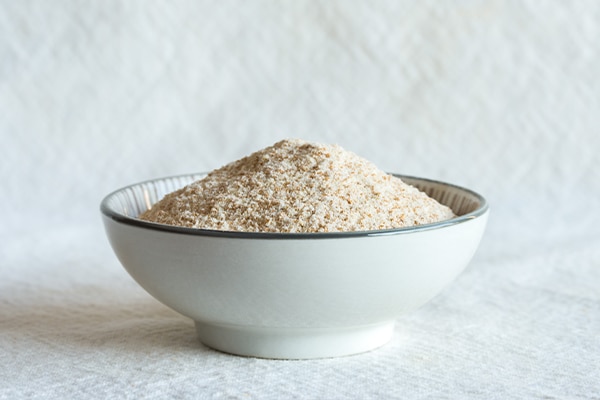What are fibre supplements and what do they do?

We’ve all heard of fibre, the complex carbohydrate found in plant foods including wholegrains, fruit and vegetables. Fibre is essential for healthy digestion, regular bowel movements and overall good health.1
The NHS recommends that adults should be getting 30g of fibre a day, however, research has revealed that most adults in the UK are only eating an average of 20g daily.2
If you are struggling to meet your daily recommendation, you might find yourself looking to take fibre supplements. In this article, we will tell you all about fibre supplements, including what they do, the benefits of taking them and how much you might need.
Types of fibre supplements
Dietary fibre supplements are designed to provide an additional source of fibre to support your daily intake. They come in various convenient forms, including powders, capsules, tablets, and gummies.
Fibre supplements can help improve digestive health, promote regular bowel movements, and support overall well-being. Fibre supplements can include one or a mix of the following fibre sources:
- psyllium husks
- linseeds
- inulin
- cellulose
- guar gum
- chitosan
- pectin

While fibre supplements should not replace a healthy fibre-filled diet, they can be a helpful top-up on days when you are struggling to meet the required 30g!
Benefits of fibre supplements
What do fibre supplements do in the body?
Just like fibre-rich foods, fibre supplements can help you have regular bowel movements, according to a 2017 study by the Mayo Clinic.3
Here’s how different types of fibre work inside the gut:4
- soluble fibre – it absorbs water, forming a gel-like substance that softens stools and feeds the friendly bacteria in your gut. Sources include oats, nuts, seeds, fruit and veg, psyllium, and inulin.5,6,7
- insoluble fibre – found in wheat, bran, nuts, cellulose, whole linseeds, chitosan and lignin, provides bulk to help push stools through your digestive system
Most high-fibre supplements contain both types of fibre.
Upping your fibre intake guards against more than just constipation:
Fibre supplements could help you manage your weight, too. A 2012 research paper in the medical journal Current Obesity Reports concluded that fibre supplements could regulate appetite.9 Additionally, a 2011 placebo-controlled study reported in the British Journal of Nutrition discovered that adding psyllium supplements to a normal diet helped to reduce weight and body fat in overweight people.10

Dosage
How much is safe to take?
Government guidelines recommend adults get 30g of fibre a day, but this is too much for a supplement, as fibre is also found in a wide variety of foods.11
How much you need will depend on your diet but never exceed the dosage on the pack. Bear in mind that more than 40g per day of fibre from all sources can interfere with the absorption of other nutrients and some medication.12
Fibre supplements are generally safe to take, but can reduce the effectiveness of certain drugs, including anti-depressants, certain antibiotics, and diabetes drugs, so talk to your doctor before taking. 13
Also talk to your doctor first if you have digestive, gut or bowel issues, including: 13,6
- A history of bowel blockage
- Crohn’s disease
- Problems swallowing or a narrowing of your gullet
- Unexplained changes in your bowel habits for longer than two weeks
- Unexplained bleeding from your back passage
- Problems passing stools despite taking laxatives
Possible side-effects of taking fibre supplements
The most common side-effects of taking fibre supplements include:14
- wind
- bloating
- stomach cramps
- hard, dry stools or constipation if you don’t drink enough fluids
Side-effects are less likely if you increase your fibre intake gradually so your digestive system can adjust.14
It’s also important to drink plenty of water to help the fibre supplement digest properly and to soften your stool.14
On very rare occasions, psyllium powder preparations have caused serious allergic reactions, though this has usually been in workers involved in making the products. Seek urgent medical advice if you experience:15
- an itchy rash
- problems breathing or swallowing
- swelling of the mouth, face, lips, tongue, or throat
The final say
- While they are no replacement for a full and balanced diet, if you struggle to meet the daily recommendation of 30g dietary fibre, supplements might be a good option as a top-up for you.
- Fibre supplements come in many different forms, including powders, capsules, tablets, and gummies. They can be made from several different fibre sources, such as psyllium husks, linseeds or inulin.
- The known benefits of getting enough fibre each day include maintaining a healthy digestive system and keeping you feeling full for longer.
- While fibre supplements are generally regarded as safe to take, it’s always best to speak to a doctor before introducing anything new to your diet, to ensure they won’t interfere with any medications or agitate any pre-existing conditions.